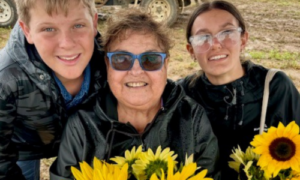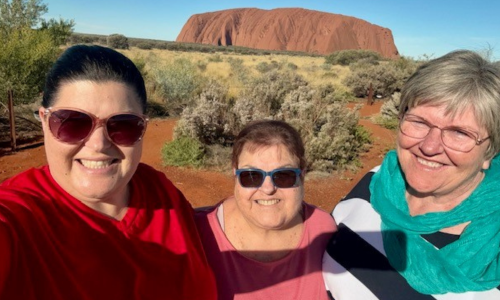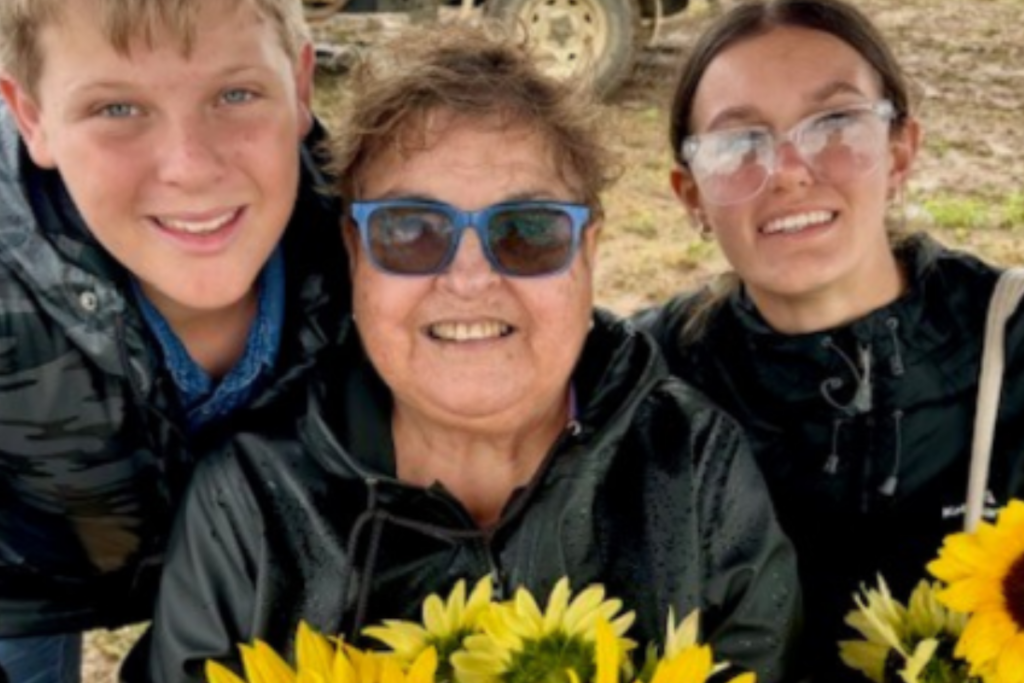Written by Erin, Maureen’s daughter.
I’d like you to meet my beautiful mum, Maureen.
She is the rock of our family, the joy of our present and the promise of our future. She has always guided, supported and loved us unconditionally.
She is retired and her joys in life are taking care of her grandchildren, socialising with friends and spending time in the garden.
Mum has battled Lynch Syndrome throughout her life which comprises of bowelportion of the digestive system that digests food (small bowel) and absorbs salts and water (large bowel); also called intestines tumours and melanomas on the skin. She has always faced the surgeries and procedures for the removal of these tumours with stalwart confidence and positivity, not allowing anything to rob her of her optimistic outlook and faith.

However, in July 2023, at the age of 70, she was diagnosed with an extremely rare cancera disease where abnormal cells split without control and spread to other nearby body tissue and/or organs located inside her heart, called Pleomorphicmany forms; cells that have different size, shape etc. Atrial Sarcomacancer arising from bones and/or soft tissue.
This tumoura tissue mass that forms from groups of unhealthy cells was removed via emergency open heart surgerytreatment involving removal of cancerous tissue and/or tumours and a margin of healthy tissue around it to reduce recurrence after Mum went into cardiac failure and was eventually followed by five weeks of radiation treatment. Unfortunately, there is no cureno evidence of disease; complete cancer remission and within months of the surgery the Atrial Sarcoma re-grew as did multiple new secondary metastatic disease.
Due to how rare the cancer is, the treatment options were limited and very unknown. The medical team advised that chemotherapya cancer treatment that uses drugs to kill or slow the growth of cancer cells, while minimising damage to healthy cells was not an option due to the fragility of Mum’s heart, but suggested immunotherapya treatment that uses a person's immune system to fight cancer treatment, which is extremely expensive and is not subsidised on the PBS for sarcomas.
Since Christmas, we have self-funded four rounds of immunotherapy, costing $4,000 ever month, which we were able to afford by using up all our family savings, as well as receiving very generous support from our family and friends via Rare Cancers Australia’s fundraising page.
Whilst grateful, Mum was also incredibly reluctant to ask for financial assistance, as she much prefers to be on the giving end of a call for help. She has found this experience mortifying, but also very humbling.
Mum’s quality of lifethe overall well-being of a person diagnosed with cancer, encompassing both physical and emotional aspects of health in those four months of immunotherapy was far beyond what we expected, with her responding well to the treatment. But the expense outweighed the result and despite showing improvements it was not enough for our Oncologista doctor who specialises in the study, diagnosis and treatment of cancer to warrant continuing self-funding the treatment. In fact, his words were “it is certainly doing something and if this were funded or a trial I would definitely continue, but it is too much money”.
We are now in the process of trialling palliative low dosethe amount of medication taken chemotherapy to try and slow metastatic growth and give us some more time with Mum. It is so disappointing that immunotherapy is not covered by Medicare as we felt there were significant benefits and less side effects.
What I have found equally frustrating is the considerable lack of awareness of rare cancers amongst medical teams.
As a paediatric nurse myself with some oncologythe study, diagnosis and treatment of cancer knowledge, it has been an eye-opening experience. Navigating the world of rare cancers is exhausting. There is so little direction and support given to families with complex medical diagnoses, that we often feel like we are just winging it. The support exists, but it is very hard to find and if you don’t know who to ask or what questions to ask, you simply just don’t receive it.
As I mentioned at the start of this story, prior to her diagnosisthe process of identifying a disease based on signs and symptoms, patient history and medical test results, Mum found joy in being social and independent. Since her diagnosis, she has experienced much loss. She has had to give up her rental house, move in with our family, stop driving and is often too tired to socialise with friends.

She is forgetful and fatigued most of the time and as a result, I have had to decrease my working hours to become her carer. I have chosen to use this responsibility as an opportunity to spend this precious time with Mum making memories and ticking off as many bucket list items as we can while she’s still well enough to enjoy them.
The most recent was a whirlwind trip to Adelaide where we boarded The Ghan to Alice Springs and Uluru. This time has inspired her and given her hope for more trips in the future. Our ultimate hope is to be able to once again access the immunotherapy treatment (without the financial impact) so that Mum can continue to live her life and see her grandchildren grow up.
We hope that with each treatment Mum endures, that she provides valued information towards the future treatment of Pleomorphic Atrial Sarcoma, so that future generations can benefit.
For now, every day is a blessing. I’m holding my Mum tight and I’m appreciative for the small wins in what continues to be the biggest battle of her life.
